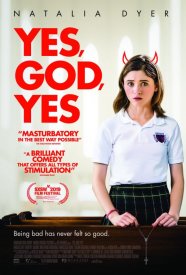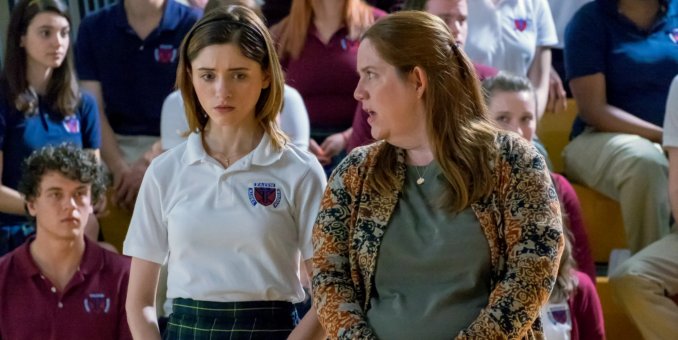 Yes, God, Yes debuts today in drive-ins around the country. It will become available through Video On Demand this coming Tuesday.
Yes, God, Yes debuts today in drive-ins around the country. It will become available through Video On Demand this coming Tuesday.
Like any teenager attending a Catholic high school, Alice (Natalia Dyer) is bombarded daily with the message that any type of sexual activity outside of marriage is dirty, disgusting and sinful. So she is mortified when a rumor begins circulating that at a party the previous weekend she had a sexual encounter with a fellow classmate. The classmate, Wade, refuses to dispel the gossip and it eventually reaches the ears of the school’s administration, who of course are none too happy.
With no one believing her, Alice elects to go on a school-sponsored weekend retreat where hopefully then her peers and teachers will see her side of the story. But once at the camp, she is subjected to more moralizing than empathizing. The retreat is really just a way to up the quotient of the anti-premarital sex lectures, as if just giving these kids a stern lecture will somehow make their hormones simmer down. Alice, meanwhile, goes online to try and find out what exactly consists of the sex act she has been accused of, but with this being the year 2000 and her go-to online source of information was an AOL chatroom, it goes all too horribly wrong for her.
On one level, Yes, God, Yes feels like a riff on 2018’a Chloe Grace Moretz film The Miseducation of Cameron Post. In that film a young girl is forced into a religiously-based gay conversion camp by her conservative and deals with some of the same themes of one’s awakening sexuality and asserting one’s own identity in the face of bigotry. But with Yes, God, Yes centering on a straight character, it feels like it is taking a half-step back, representation-wise.
But that does not diminish in any way what writer/first-time director Karen Maine is doing here. Yes, God, Yes is also addressing the hypocrisy of those who preach a certain morality the loudest. It also touches on the the idea that some people, in their driving need to feel morally superior to others, will be willing to believe an unsubstantiated rumor rather than the word of the involved person themselves. It is an interesting angle to approach and deliver a #MeToo/#BelieveWomen message, and that is very much appreciated.
As the co-screenwriter on the original short film that became the indie feature hit Obvious Child, Maine is no stranger to attacking difficult and potentially taboo topics with sensitivity and a dash of humor. She has created a complex character in Alice, whose naivety and innate curiosity – which can often be a liability in environments which require strict conformity – could seem at odds in the hands of a less subtle, less empathetic writer.
Maine’s screenplay is very carefully observed, at least according to this Catholic high school graduate’s memory. There’s the young, “hip” priest who tries to reach the students on their level, the one whom years later you find out some weird bit of news about them. There are the students who think piety is a contest and are ready to be a “better” religious person than their classmates. And of course, there’s the heaps of Catholic guilt and attendant misogyny over one’s awakening sexuality to be found. She also finds humor in absurd moments like when the young, “hip” priest suggests to the student campers that when Peter Gabriel was singing “In Your Eyes,” he was actually singing about Jesus.
And for as solid as the film is through it’s first two acts, the last act does feel a bit contrived. Alice runs away from the camp and finds herself at a biker bar getting some solid life advice from the lesbian bartender. Since Alice has been very proactive in her journey of self-discovery to have her passively be given the answer to her problems by a random, newly introduced character so near the end feels like a bit of a cheat.


